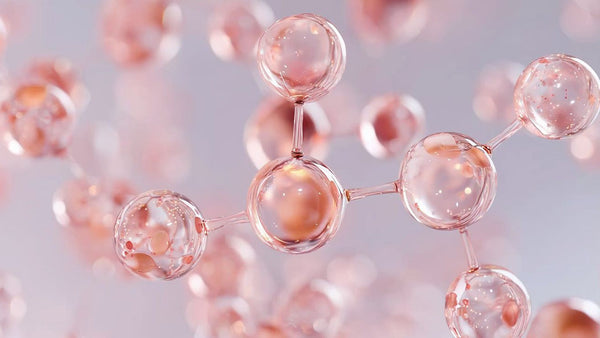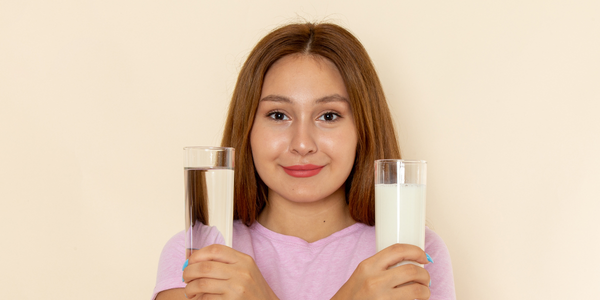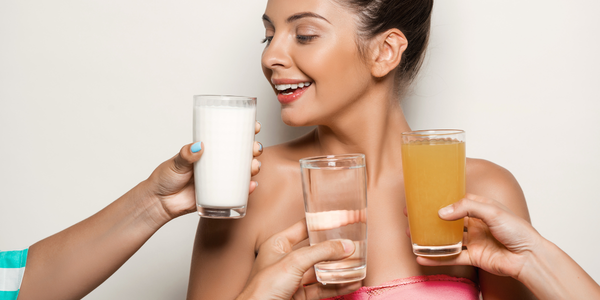When people don’t like what they see in the mirror, they don’t think twice before spending a lot of money on expensive skin care products or parlour sessions.
They spend so much of their energy and pocket on fixing the problem on the outside, that more often than not, they fail to see that the actual source of the problem may be rooted within.
Diet plays quite an important role in determining one’s skin health. If one’s daily food lacks the essential nutrients that are instrumental in bolstering skin health, one may experience skin problems from time to time like acne, redness, pigmentation, and the like. One of the essential nutrients for improving skin health is protein.
Protein deficiency in the body can manifest in different ways and one of the major ways in which it could affect health is by causing red, puffy, and flaky skin with depigmentation that could leave the skin lacklustre, dull, and dry.
Scary isn’t it? Before we look at a long-term solution to this problem, let’s take a look at protein’s role in skin care a little more in-depth, shall we? So, let’s get started.
What Makes Protein So Important For The Skin?
Here are some of the points that highlight why protein is so important for the skin.
Strengthens and provides structure to the skin
Skin is undoubtedly the largest organ in the body that protects it from external factors like pollutants, bacteria, chemicals, and temperature.
Constant exposure to these factors can severely impact skin health, causing it to age or damage, if not taken care of properly. That is where including protein in your diet comes into the picture as it goes a long way in contributing to healthy skin.
An essential macronutrient, protein acts as a repairing agent that strengthens and provides structural support to the skin.
Protein contains essential amino acids that are chemical molecules, which occur naturally and combine to produce proteins, including collagen that gives the skin moisture and sheen and acts like a glue to give structure to the body.
Collagen and amino acids like elastin are essentially the building blocks of peptides and proteins that contribute to keeping the skin healthy, smooth, firm, and elastic all the time while slowing down signs of ageing.
Consuming protein in adequate amounts and making it a part of your regular diet helps in boosting collagen production in the body (which is known to decline with age) and will help retain your youthful glow for a long time.
Given that amino acids and collagen decline during activity, digestion, and ageing, having a regular supplement for the same can go a long way in helping overall health, especially skin health.
Prevents Skin Dryness
No one likes dry, flaky lacklustre skin. Dry skin is a result of moisture inadequacies, which is quite a common phenomenon during winter.
But when one begins to experience dry skin throughout the year, that’s when they know that it’s a skin condition that needs immediate attention.
Sure, you can always resort to the application of thick oily creams but too much of the same can lead to clogging of the pores, which can further cause the pores to get clogged, causing acne or pimples.
Well, another reason for dry, flaky skin could also be protein deficiency. If that’s the case, then including protein and omega-3 fatty acids in your diet can help you regain that lost moisture and lead to the development of smooth, firm, and moisturised skin.
With proper hydration, the skin will be able to retain its moisture and delay the appearance of any signs of ageing.
Speeds Up Healing Process
Protein plays a major role in repairing and healing the body. It helps in muscle recovery, tissue repair and even healing the skin.
Research shows that proteins and amino acids work together to help increase the cell turnover, which means it helps slough down the old skin cells to make space for the new ones.
In simpler terms, this process is also known as the skin healing process, which picks up speed with the inclusion of protein in one’s diet. This helps in healing wounds, acne scars, or any other form of skin inflammation faster, eventually resulting in healthy, radiant, glowing skin.
Protects the Skin From Free Radical Damage
One of the biggest nightmares for the skin is to deal with free radical damage produced due to oxidative stress, responsible for breaking down skin collagen, resulting in saggy skin, dark spots, pigmentation, fine lines, wrinkles, and blemishes.
This free radical activity also results in skin inflammation. The sure shot way of protecting the skin from the damages of free radical activity is by increasing the intake of protein in one’s diet.
Some varieties of amino acids also act as antioxidants that are known to naturally offset skin damage owing to free radical activity.
At the same time, some amino acids aid in the production of our skin’s own antioxidants. Cysteine and methionine, two essential amino acids, are themselves known to have antioxidant effects.
Glutathione, another important antioxidant beneficial for skin health, known to protect cells from free radical damage and the harmful effects of UV rays is produced with the help of these amino acids.
Another essential amino acid, glutamine, aids in maintaining the pH balance of the skin, which is ideal at 5.5 pH. At this level, the skin is able to maintain a good barrier along with natural oils, bacteria and moisturizers that act as a true protective defence organ.
All these factors that contribute in building a protective shield is known as an acid mantle which protects the body from all kinds of irritants, pollutants, and pathogens, among other things.
Some amino acids are also present naturally in the skin that come in contact with aquaporins (our body's water transport system) and keep the skin hydrated.
Thus we see that either consuming amino acids or administering them topically can help strengthen the immune system and retain skin moisture, and make it more resilient in combating damages caused due to free radical activity or ageing.
So What Is The Perfect Solution To The Protein Deficiency In The Body?
While protein-rich foods like lean meat, chicken, Greek yogurt, cheese, kidney beans, mushrooms, and sprouts, to name a few, should be included in one’s daily diet to fight any possible deficiencies, it’s always best to include a protein supplement to one’s regular routine, especially when one is vegan or vegetarian.
Additionally, a hectic life can often push one to go for food that’s easily available than one that is properly planned and prepared from scratch, leading to all kinds of potential deficiencies and illnesses if continued in the long run.
But worry not for Wellbeing Nutrition has come up with a permanent solution for protein deficiency, which is none other than its product- Superfood Plant Protein Powder.
After years of research, Wellbeing Nutrition has finally launched its very own 100% organic and plant-based protein powder.
It is a perfect protein solution for one and all as this blend is derived from rich ingredients sourced from all over the globe.
Derived from golden European peas(pea protein isolate), brown rice & chia seeds, this protein comes with a blend of microprotein plant peptides and dietary fibre, which makes it the best plant-based supplement for you.
It also helps with better absorption and aids in boosting your metabolism. Additionally, it contains all essential amino acids and branched chain amino acids, which are necessary to preserve and build lean muscle tissue, repair skin or reduce inflammation.
This protein powder is a natural blend, which is free from artificial sugar and colourants. It is available in two flavours-Vanilla Caramel Protein and Dark Chocolate Hazelnut.
Wellbeing Nutrition always maintains high-quality standards when it comes to supplements and this protein powder is no different.
So, hurry up and get yourself your very own pack of Superfood Plant Protein Powder and say goodbye to all skin-related problems!
References:
-
Schagen SK, Zampeli VA, Makrantonaki E, Zouboulis CC. Discovering the link between nutrition and skin aging. Dermatoendocrinol. 2012 Jul 1;4(3):298-307. doi: 10.4161/derm.22876. PMID: 23467449; PMCID: PMC3583891. (https://www.ncbi.nlm.nih.gov/pmc/articles/PMC3583891/)
-
Role of food's protein on skin health, May 2009Journal of Plastic Dermatology 5(2):191-195, Authors:Antonio Paoli, Andrea Fratter, (https://www.researchgate.net/publication/230577566_Role_of_food's_protein_on_skin_health)
-
Murakami H, Shimbo K, Inoue Y, Takino Y, Kobayashi H. Importance of amino acid composition to improve skin collagen protein synthesis rates in UV-irradiated mice. Amino Acids. 2012 Jun;42(6):2481-9. doi: 10.1007/s00726-011-1059-z. Epub 2011 Aug 23. PMID: 21861170; PMCID: PMC3351609. (https://www.ncbi.nlm.nih.gov/pmc/articles/PMC3351609/)
-
Takaoka M, Okumura S, Seki T, Ohtani M. Effect of amino-acid intake on physical conditions and skin state: a randomized, double-blind, placebo-controlled, crossover trial. J Clin Biochem Nutr. 2019 Jul;65(1):52-58. doi: 10.3164/jcbn.18-108. Epub 2019 May 24. PMID: 31379414; PMCID: PMC6667387. (https://www.ncbi.nlm.nih.gov/pmc/articles/PMC6667387/)
-
Bolke L, Schlippe G, Gerß J, Voss W. A Collagen Supplement Improves Skin Hydration, Elasticity, Roughness, and Density: Results of a Randomized, Placebo-Controlled, Blind Study. Nutrients. 2019 Oct 17;11(10):2494. doi: 10.3390/nu11102494. PMID: 31627309; PMCID: PMC6835901. (https://www.ncbi.nlm.nih.gov/pmc/articles/PMC6835901/)
-
Verdier-Sévrain S, Bonté F. Skin hydration: a review on its molecular mechanisms. J Cosmet Dermatol. 2007 Jun;6(2):75-82. doi: 10.1111/j.1473-2165.2007.00300.x. PMID: 17524122. (https://pubmed.ncbi.nlm.nih.gov/17524122/)
-
Poljšak B, Dahmane R. Free radicals and extrinsic skin aging. Dermatol Res Pract. 2012;2012:135206. doi: 10.1155/2012/135206. Epub 2012 Feb 29. PMID: 22505880; PMCID: PMC3299230. (https://www.ncbi.nlm.nih.gov/pmc/articles/PMC3299230/)




























